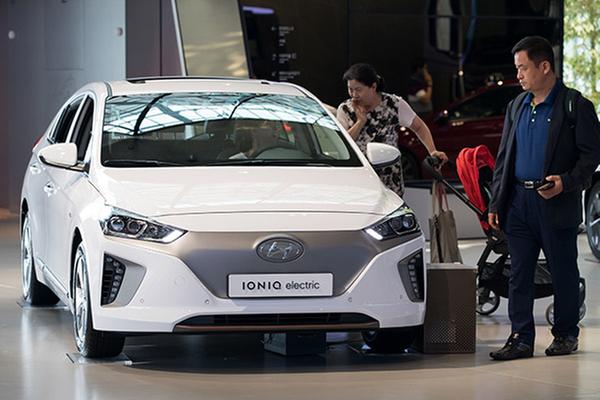Hyundai gets mired in China market
 |
| Visitors look at an Ioniq electric vehicle by Hyundai at the Hyundai Motorstudio showroom in Goyang, South Korea.[Photo/Agencies] |
Lagging sales, plant shutdowns signal troubled waters
South Korean carmaker Hyundai Motor is fighting an uphill battle in China and there is little sign of it recovering to its former glory, according to analysts.
One recent example of its difficult operating conditions is that all of its four completed factories in China suspended production for more than a week in late August.
Plastic Omnium, a supplier, stopped deliveries of fuel tanks after the automaker had delayed payments totaling 110 million yuan ($16.7 million), according to a snapshot of a Beijing Hyundai document that went viral last week online.
The Chinese joint venture with BAIC Motor Corp did not verify the snapshot's authenticity by publication time, but a Hyundai spokesman in Seoul told Bloomberg on Wednesday that the delayed payments were because of poor sales in China, its largest market.
Statistics from the China Passenger Car Association show that Beijing Hyundai sold 415,000 cars from January to July, a nearly 30 percent slump year-on-year.
The spokesman said discussions are ongoing with the supplier regarding payments, but declined to elaborate on the amounts involved and whether other suppliers were also affected.
In a document filed to the Hong Kong Stock Exchange on Wednesday, BAIC Motor Corp said the incident has been solved and the affected factories have resumed operations.
While Hyundai has prevented a prolonged crisis, the shutdowns have exposed how its China operations are deteriorating, according to industry insiders.
Hyundai was one of the first international brands to sell more than 1 million cars a year in China, and Beijing Hyundai's sales hit a record high of 1.14 million vehicles in 2016.
But, its sales started to tumble from the start of this year, and the downturn was made even steeper by a consumer backlash after South Korea's plans to deploy a United States missile-defense system.
The poor sales have forced Beijing Hyundai to scale down its 2017 sales target from 1.25 million to 800,000 vehicles in China.
Analysts said one cause of the automaker's troubles is its lineup. Out of 18 models it manufactures in China, only four are SUVs, which are the fastest-growing segment nationwide.
Statistics from the China Association of Automobile Manufacturers show that from January to July, 5.21 million SUVs were sold, a 17 percent rise year-on-year, while all other segments fell during the same period.
The automaker is planning to bring its Genesis luxury brand to China, possibly as early as next year, but it will be hard to establish a firm market presence as competition is already fierce.
Another problem that confronts Hyundai brand-which many believe is the root cause of its fall-is that Chinese automakers, including Geely and Great Wall Motor, are coming up with more competitive products.
Both automakers have unveiled their higher-end brands that target to compete against international carmakers. Great Wall Motor's Wey brand, with two cars already launched, is drawing a larger following. Geely boasts technological backup from Swedish premium brand Volvo and is set to unveil its first product under its Lynk & Co brand later this year.
Geely Chairman Li Shufu told reporters in March that "Chinese brands are now already as good as, if not better than, South Korean brands in terms of quality, and I believe we can catch up with Japanese brands in one or two years".
Beijing Hyundai's poor sales could in return be affecting its production system.
The joint venture has built five plants in China, with a total production capacity of more than 1.6 million vehicles a year, twice its sales target of 2017.
"Low utilization might continue to drag down the joint venture's performance in the near term," said Patrick Yuan, an automotive sector analyst at investment bank Jef eries Hong Kong. "If the unfavorable conditions cannot be relieved in medium term, the Hyundai brand might become irrelevant in a competitive market ahead."

